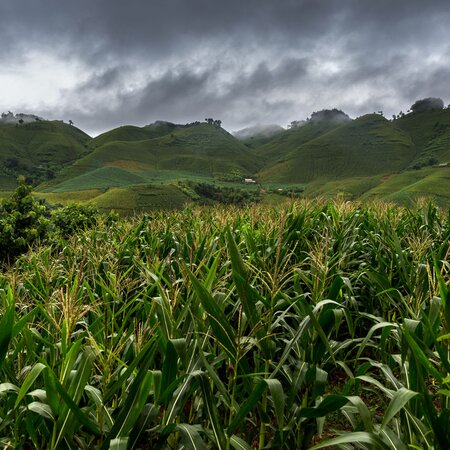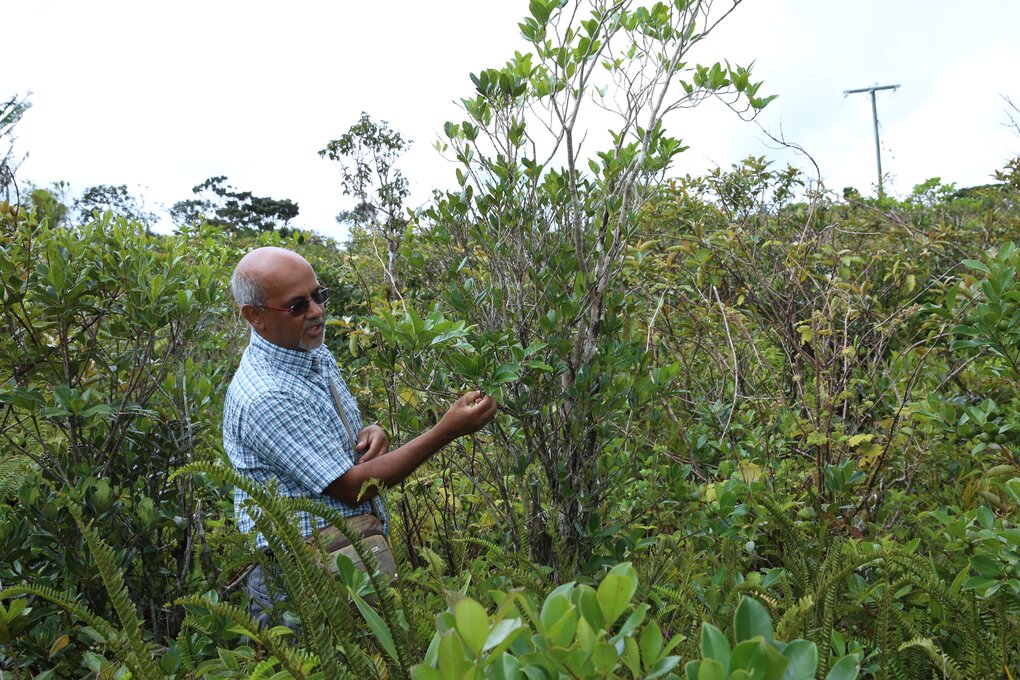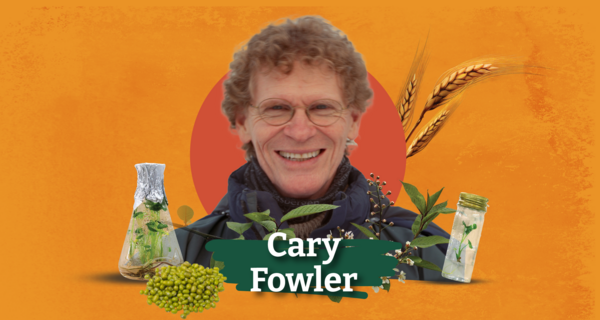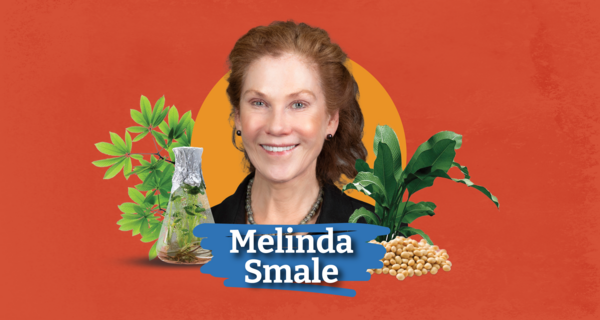Ehsan Dulloo: Mauritian Champion of Biodiversity Who Set Standards for Genebanks
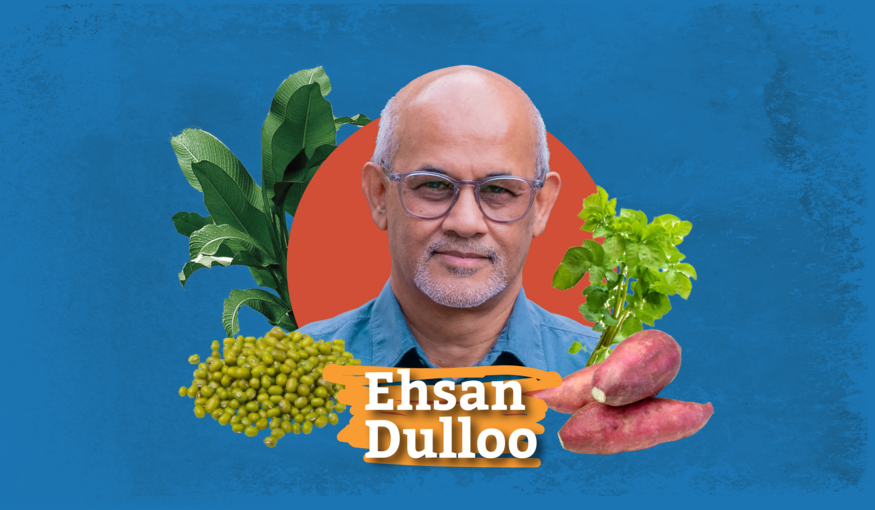
21 November 2024
This month, Dr. Ehsan Dulloo joins the ranks of the Crop Trust’s Seed Heroes for his contribution to the development of internationally agreed genebank standards, widely used manuals for seed handling, and biodiversity conservation strategies in Mauritius and beyond.
Mauritius is an icon of African biodiversity, and one of the island nation’s foremost experts on conservation is Ehsan Dulloo.
In a career spanning more than four decades, the U.K.-educated conservation biologist has long been recognized all over the world as a guardian of plant genetic resources. He is also a champion of conservation on Mauritius itself, a biodiversity hotspot once home to a now famously extinct bird, the dodo.
For more than 16 years, Dr. Dulloo held key roles in government and non-governmental agencies dedicated to the restoration of biodiversity and natural resources in his homeland. He notably helped establish the first national park in Mauritius, an island nation located in the Indian Ocean about 1,200 miles off the coast of East Africa.
Yet while the prize-winning scientist is often associated with the tropical paradise that is his native country – which writer Mark Twain once compared to heaven – Dulloo’s passion for biodiversity took him much further afield.
He held senior positions at the Alliance of Bioversity International and CIAT (The Alliance) and its predecessor bodies, as well as the Food and Agriculture Organization (FAO) of the United Nations. His career took him to Nairobi and then to Rome to design and manage projects on the conservation and use of plant biodiversity, especially agrobiodiversity, at national, regional and international levels.
“The most satisfying part of my work with Bioversity International has been the opportunity to contribute to the global work on plant genetic resources, identifying research needs and developing tools to help countries manage genebanks better and to conserve diversity in situ, especially crop wild relatives,” Dulloo says.
Crop wild relatives are the cousins of our food crops that still grow in nature and have evolved to survive changing and extreme conditions. They are a source of new genetic diversity that plant breeders can tap to develop food crops that are more productive, nutritious and resilient.
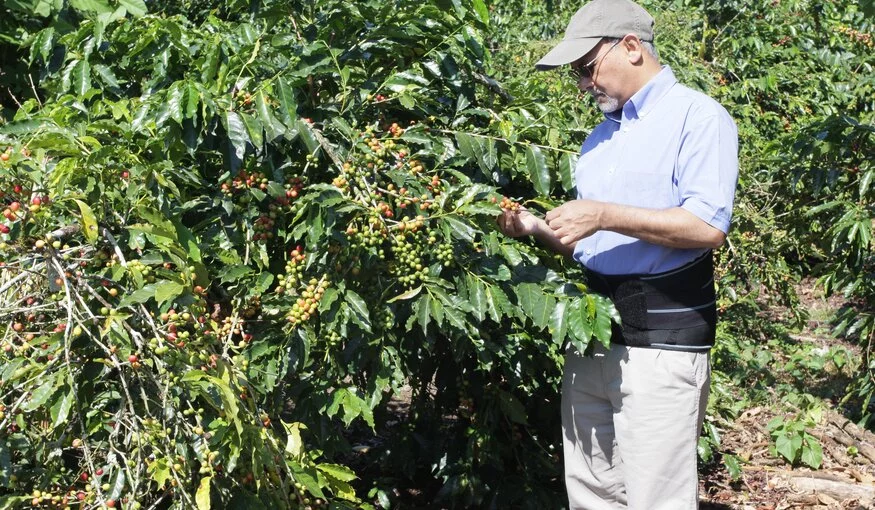
Ehsan Dulloo at the International Coffee Collection at CATIE.
Setting the Standards for Genebanks
Dulloo’s most significant achievement is widely considered to be the development of standards and a series of training manuals for seed conservation in genebanks. The Manual of Seed Handling in Genebanks (2006) is used by genebanks all over the world as a key reference for their work. He also led the process for developing the FAO revised genebank standards for plant genetic resources for food and agriculture, published in 2014.
“It brought together world experts on the subject and came up with a consensus on genebank standards for seed and field collections as well as in vitro conservation and cryopreservation,” Dulloo says. “It was the first time that internationally agreed standards for in vitro and cryopreservation were ever developed.”
Genebanks contribute to more resilient food systems by conserving crop diversity in the long term and making it available to users worldwide. Plant diversity can be conserved ex situ in different kinds of genebanks: in field collections, in refrigerated seed banks, in glass tubes (in vitro) or in super-frozen form thanks to liquid nitrogen (cryopreservation).
The Mauritian scientist also conceptualized the Seeds for Needs initiative, which launched in Ethiopia in 2009 and is now active in 14 countries. This provides smallholder farmers with better information and access to a carefully tailored, diverse portfolio of crop varieties, including landraces from genebanks, to increase the climate resilience of their seed systems.
He also helped establish the CGIAR Crop Genebank Knowledge Base as part of a World Bank-funded project to facilitate access to knowledge and best practices for the management of selected crops in genebanks.
In 2023, the Curt Bergfors Foundation awarded its Food Planet Prize to the Agrobiodiversity Index, a project that Dulloo co-led at the Alliance of Bioversity and CIAT. The tool makes it possible to measure the gap between the agricultural biodiversity a country actually has in its food system, and what it could have. This helps design policies to maintain healthy diets and resilient production systems, according to the Alliance.
Ehsan Dulloo showing an endemic wild relative plant of coffee in Mauritius. Credit: Crop Trust/Luis Salazar
Early Life
Mohammad Ehsan Dulloo was born in 1957 in an urban town called Rose-Hill on the island of Mauritius. His father was an administrator in the civil service.
A native speaker of the local creole language, Dulloo was motivated to pursue studies in ecology when a team of scientists from the University of Edinburgh gave a presentation at his high school. They were on an ecological expedition to Round Island, a remote islet off the northeast coast of Mauritius, where flora and fauna that was extinct on the mainland reputedly still survived.
“From then on, I became very curious about the fate of the endangered species of flora and fauna on the island,” he says.
After his undergraduate degree in environmental biology, which he completed in 1980 at Queen Mary College of the University of London, Dulloo was recruited as Assistant Conservator of Forest in Mauritius. He was responsible for the management of natural forest and nature reserves, including Round Island.
Saving Endangered Plant Species
His work revolved around trying to save as many of the highly threatened plant species as possible and developing measures to conserve them in situ in their natural habitats, while also propagating them in nurseries.
“In doing so, I realized that managing the genetic diversity of these plants was crucial for restoration success,” he says.
After presenting a paper on the conservation of wild coffee species from Mauritius at a workshop in Africa, Dulloo was offered a scholarship to enroll in a master’s at the University of Birmingham. He completed it in 1990. Eight years later, he earned a Ph.D. on the conservation of genetic diversity in wild coffee species in the Mascarene Islands, which include Mauritius.
These studies led to his international career at the International Plant Genetic Resources Institute, now known as the Alliance of Bioversity International and CIAT. He spent 12 years working on germplasm conservation strategies in sub-Saharan Africa and the management of agricultural biodiversity on the continent. After spending a year at FAO as Senior Policy Officer, Dulloo returned to the Alliance of Bioversity International and CIAT in 2019 as Program Leader/Principal Scientist.
Dulloo laments that not enough is being done to conserve plant genetic resources amid the challenges of climate change.
“The importance and value of genebanks do not receive adequate attention from most governments, as national genebanks remain largely unfunded,” he says. “The Crop Trust is doing a great job in securing resources for its Endowment Fund, but there is still a lack of action from national governments on their commitments to support genebanks.”
We are honored to welcome Dr. Dulloo into our hall of Seed Heroes in recognition of his outstanding contributions to setting global genebank standards and tireless advocacy for biodiversity in Mauritius and around the world.
Timeline:
- 1957: Born in Mauritius
- 1980: Earns Bachelor of Science (Hons) degree at Queen Mary College, University of London (U.K.)
- 1982‒1991: Assistant Conservator for the Mauritius Forestry Service
- 1990: Awarded Master of Science degree at the University of Birmingham (U.K.)
- 1991‒1995: Advisor on conservation issues in Ministry of Agriculture and Natural Resources, helps establish first national park in Mauritius
- 1996‒1998: Plant Conservation Manager at Mauritian Wildlife Foundation
- 1998: Awarded Ph.D. in conservation biology at the University of Birmingham (U.K.)
- 1999‒2011: IPGRI/Bioversity International conservation scientist in Nairobi and Rome
- 2006: Zayed International Prize for the Environment
- 2009: Winner of World Bank Development Marketplace Award
- 2011‒2012: Senior Policy Officer at FAO in Rome
- 2012‒2022: Principal Scientist at Alliance of Bioversity and CIAT
- 2022‒present: Honorary Research Fellow at Alliance of Bioversity and CIAT
- 2023: Winner of Food Planet Prize of the Curt Bergfors Foundation
Categories: For Educators, For Partners, For Students

